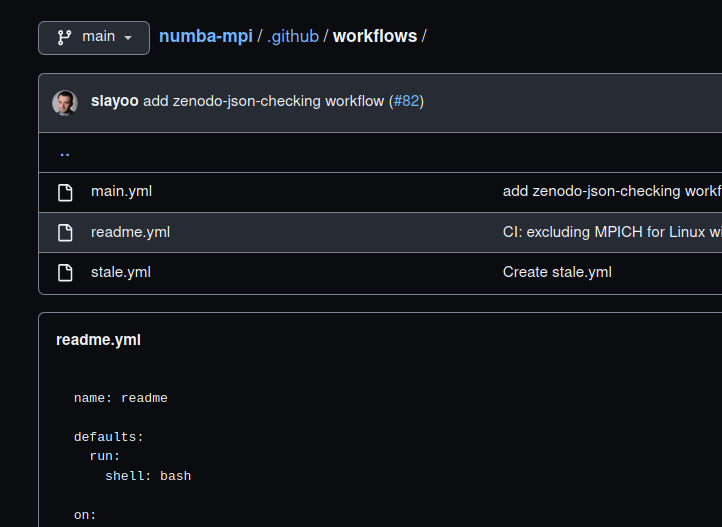numba-mpi provides Python wrappers to the C MPI API callable from within Numba JIT-compiled code (@njit mode).
Support is provided for a subset of MPI routines covering: size/rank, send/recv, allreduce, bcast, scatter/gather & allgather, barrier, wtime
and basic asynchronous communication with isend/irecv (only for contiguous arrays); for request handling including wait/waitall/waitany and test/testall/testany.
The API uses NumPy and supports both numeric and character datatypes (e.g., broadcast).
Auto-generated docstring-based API docs are published on the web: https://numba-mpi.github.io/numba-mpi
Packages can be obtained from
PyPI,
Conda Forge,
Arch Linux
or by invoking pip install git+https://github.com/numba-mpi/numba-mpi.git.
numba-mpi is a pure-Python package. The codebase includes a test suite used through the GitHub Actions workflows (thanks to mpi4py's setup-mpi!) for automated testing on: Linux (MPICH, OpenMPI & Intel MPI), macOS (MPICH & OpenMPI) and Windows (MS MPI).
Features that are not implemented yet include (help welcome!):
- support for non-default communicators
- support for
MPI_IN_PLACEin[all]gather/scatterandallreduce - support for
MPI_Type_create_struct(Numpy structured arrays) - ...
import numba, numba_mpi, numpy
@numba.njit()
def hello():
src = numpy.array([1., 2., 3., 4., 5.])
dst_tst = numpy.empty_like(src)
if numba_mpi.rank() == 0:
numba_mpi.send(src, dest=1, tag=11)
elif numba_mpi.rank() == 1:
numba_mpi.recv(dst_tst, source=0, tag=11)
hello()The example below compares Numba + mpi4py vs. Numba + numba-mpi performance.
The sample code estimates n_intervals handled by separate MPI processes
and then obtaining a sum using allreduce.
The computation is carried out in a JIT-compiled function and is repeated
N_TIMES, the repetitions and the MPI-handled reduction are done outside or
inside of the JIT-compiled block for mpi4py and numba-mpi, respectively.
Timing is repeated N_REPEAT times and the minimum time is reported.
The generated plot shown below depicts the speedup obtained by replacing mpi4py
with numba_mpi as a function of n_intervals - the more often communication
is needed (smaller n_intervals), the larger the expected speedup.
import timeit, mpi4py, numba, numpy as np, numba_mpi
N_TIMES = 10000
N_REPEAT = 10
RTOL = 1e-3
@numba.njit
def get_pi_part(out, n_intervals, rank, size):
h = 1 / n_intervals
partial_sum = 0.0
for i in range(rank + 1, n_intervals, size):
x = h * (i - 0.5)
partial_sum += 4 / (1 + x**2)
out[0] = h * partial_sum
@numba.njit
def pi_numba_mpi(n_intervals):
pi = np.array([0.])
part = np.empty_like(pi)
for _ in range(N_TIMES):
get_pi_part(part, n_intervals, numba_mpi.rank(), numba_mpi.size())
numba_mpi.allreduce(part, pi, numba_mpi.Operator.SUM)
assert abs(pi[0] - np.pi) / np.pi < RTOL
def pi_mpi4py(n_intervals):
pi = np.array([0.])
part = np.empty_like(pi)
for _ in range(N_TIMES):
get_pi_part(part, n_intervals, mpi4py.MPI.COMM_WORLD.rank, mpi4py.MPI.COMM_WORLD.size)
mpi4py.MPI.COMM_WORLD.Allreduce(part, (pi, mpi4py.MPI.DOUBLE), op=mpi4py.MPI.SUM)
assert abs(pi[0] - np.pi) / np.pi < RTOL
plot_x = [1000 * k for k in range(1, 11)]
plot_y = {'numba_mpi': [], 'mpi4py': []}
for n_intervals in plot_x:
for impl in plot_y:
plot_y[impl].append(min(timeit.repeat(
f"pi_{impl}({n_intervals})",
globals=locals(),
number=1,
repeat=N_REPEAT
)))
if numba_mpi.rank() == 0:
from matplotlib import pyplot
pyplot.figure(figsize=(8.3, 3.5), tight_layout=True)
pyplot.plot(plot_x, np.array(plot_y['mpi4py'])/np.array(plot_y['numba_mpi']), marker='o')
pyplot.xlabel('n_intervals (workload in between communication)')
pyplot.ylabel('wall time ratio (mpi4py / numba_mpi)')
pyplot.title(f'mpiexec -np {numba_mpi.size()}')
pyplot.grid()
pyplot.savefig('readme_plot.png')- MPI standard and general information:
- MPI implementations:
- MPI bindings:
Development of numba-mpi has been supported by the Polish National Science Centre (grant no. 2020/39/D/ST10/01220).










